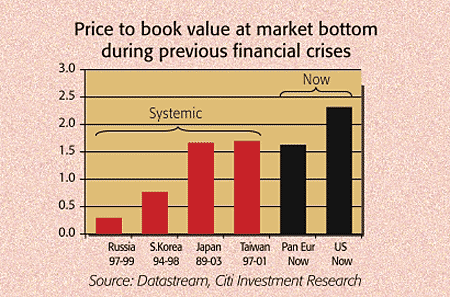
Sir John Templeton always said that one should buy at the point of maximum pessimism. So surely that must make it time to buy back into the banking sector? In the past fortnight, the investment banking model in America has died, with the demise of Lehman’s, the forced takeover of Merrill’s, and the transformation of Goldman Sachs and Morgan Stanley into ordinary commercial banks. In the UK, Britain’s biggest mortgage lender, HBOS, has been swallowed by Lloyds TSB to create a ‘superbank’, and regulators across the globe have banned shorting of financial stocks. Meanwhile, Anthony Bolton, the former Fidelity star fund manager, believes we are “entering the final phase of the bear market”. It’s pretty pessimistic stuff.
But it isn’t the point of maximum pessimism. No, things are going to get worse. The International Monetary Fund (IMF) reckons there’s a further one trillion dollars in writedowns set to hit the global financial system, on top of the $514bn seen so far – and that’s far from the bleakest view. As Felix Zulauf told Barron’s this week, “deleveraging is a very painful process and will run longer and deeper than anybody can imagine”. Banks are extraordinarily vulnerable to this unwinding. According to Citigroup, at the end of last year, US brokers and European banks had average gearing (assets to equity) of 35 times. “At times likes this, the use of fundamental analysis… becomes questionable. Who cares if the equity looks cheap if the company does not have the liquidity to remain operational?”
Housing markets on both sides of the Atlantic are in freefall, which means that property-related assets are still deteriorating. Philip Aldrick in The Daily Telegraph says analysts believe the collapse of Lehman Brothers and ensuing fire sale of assets means that further fund raisings (which are bad news for shareholders, as they dilute existing holdings) will be required as portfolios are written down further to reflect these new values. In fact, Lloyds TSB cannily took advantage of last week’s short-covering bounce to raise £767m from a placing of new shares, right after its deal with HBOS.
Then there’s the grim reality of what’s happening in the ‘real’ economy. Foreclosures in America and repossessions in Britain are rising, which means more people unable to repay their debts – a further headache for the banks. On top of that, there are the bad debts from personal loans and credit cards, which we’ve yet to see coming through.
Tom Rayner at Citigroup reckons British bank’s loan books may need to shrink by as much as 30% over the next three years, and in some quarters he is considered optimistic. That will wipe out profitability – banks just won’t make profits next year. Not in America. Not in Britain. And, says Bedlam Asset Management, not in Iceland, Spain or Eastern Europe – where governments are still in denial about the scale of the problem – either.
Perhaps most telling are the actions of HSBC, seen as one of the sturdiest banks in the sector. While Lloyds snapped up HBOS and Barclays picked over Lehman, HSBC has shunned deals, declaring no interest in partnering with Morgan Stanley, for example. It also dropped out of its £3.3bn purchase of Korea Exchange Bank earlier this week. Clearly, the bank – which should understand its sector better than anyone else – believes now is the time to batten down the hatches and hang on to what cash it has left. That’s the right example for the rest of us to follow.
Banking sector: stocks are cheap… but not cheap enough
According to Citigroup, in “previous financial crises, there has always been a time when listed financial stocks stop underperforming.” One sign is broader stockmarkets falling by more than a fifth (ie, entering a bear market), which has happened already. But on other measures, there’s still a way to go.
While it seems ever clearer that the US and UK are heading for, if not already in recession, the broad economic data isn’t yet gloomy enough for investors to have priced in the impact of a recession on financial stocks, which would involve “higher defaults, rising provisions, further asset writedowns, weaker loan demand, and further earnings downgrades,” says Citigroup.
Prices of financial groups have fallen in the region of 50%-95% in previous crises. But so far, the lows hit by US and European financials in July were 53% and 47% below peak levels. Stocks are getting cheaper, but they are still not cheap enough. Valuations for US and European financials are down to between 1.0 to 1.5 times price to book value. But in previous “systemic crises”, they’ve fallen as far as 0.5 to 0.75 times.
Given the extent of this crisis, we’re inclined to wait to see the lower end of that band before thinking about buying.